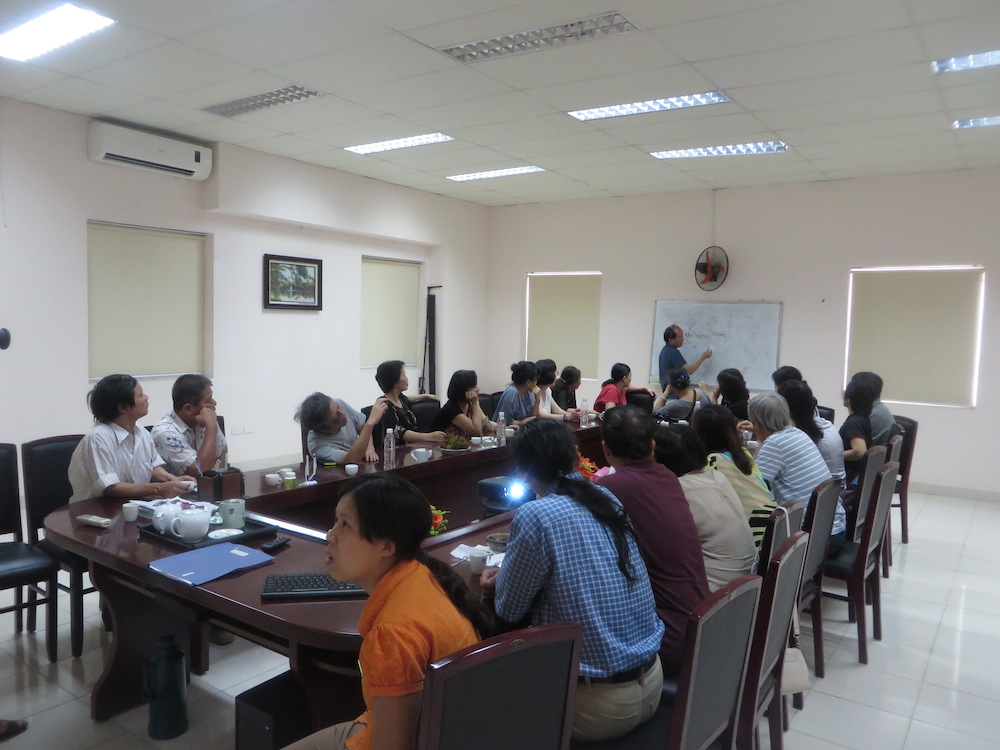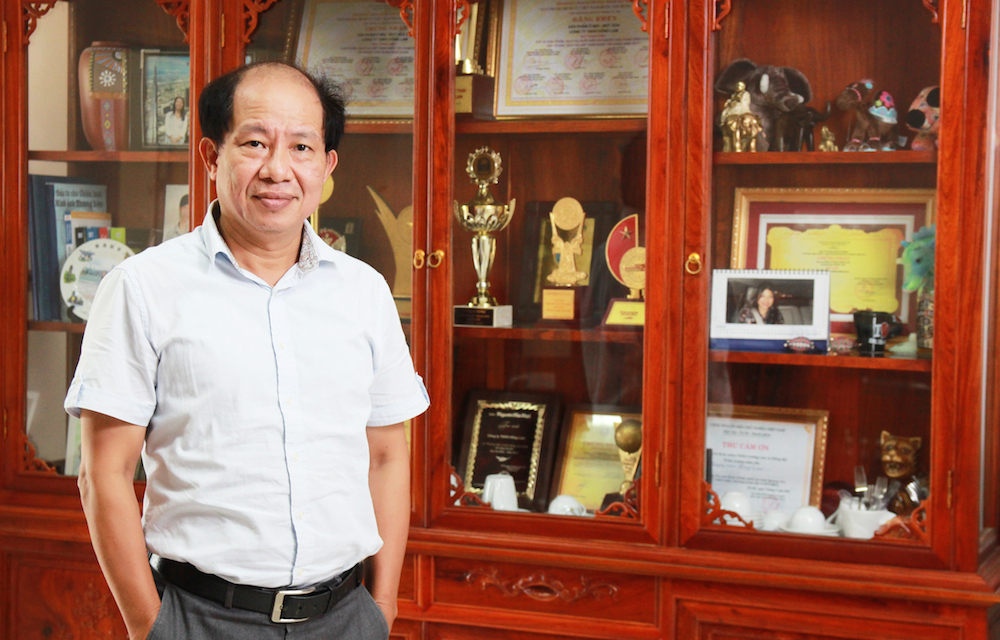‘Hong Lam’, a traditional brand which represents the “Essence of Vietnam gifts”, has occupied a place in the hearts of both local and international consumers since the 90s. The Columnist sits down with Mr Nguyen Hong Lam, Founder and CEO of Hong Lam JSC to find out more about his learning spirit and innovative thinking behind applying innovations of the world into his company from management to production and operations.
The Columnist (TC): Could you share with the readers of The Columnist the path that lead you to the traditional product processing business?
Mr Nguyen Hong Lam (NHL): Coming from a family of academics and intellectuals, my grandfather was a deputy at The First National Assembly and the first President of Phu Tho Province, he also served as Advisor for the Vietnam Central Committee in Laos; my father, a communist, was a Deputy Editor of the People’s Army Publishing House and my mother was a chemical engineer. I studied Film and was a Team Leader of the Great Special Team 196 of the Military Technical Institute. As part of my education I was sent to study in the Soviet Union and after that, I came back to work at the Military Film studio.
In the early 90s, as with many other people at the time, I felt the pressures of making ends meet and so I started my own business. In the beginning, I only bought and resold goods to make money, but eventually I figured out how to build up a sustainable and long-term business. After studying and referencing different business models, including the model of creating added values for agricultural products from Singapore, I learned that there are four paths to make a profit: 1- speculation (time), 2 – wholesale long distance (space), 3- process manufacturing and 4- system and brand building. Out of these four paths, number 4 is the most difficult one, but I decided to choose this path. Fortunately, when I started my business, I met some customers who were in need of connection and processing information about the market and business and it was this first step that helped me to build the initial capital to start the fruit processing business.
TC: As quoted in many articles on preservation, inheritance and development issues at Hong Lam, you have shared that you “pursue the policy of knowledge sharing for scaling up strength and synchronised quality management”. So could you share more on how that knowledge sharing policy has been beneficial for Hong Lam in terms of creativity and innovation?
NHL: In order for Hong Lam to continue pursuing Path 4, we strive to build Soft power for our organization, operating based on the principle of sharing knowledge from each small organization to larger organizations, to turn it into a common ownership of knowledge. This is the principle of sharing knowledge for building up strength. At Hong Lam, we organize and manage product quality according to Total Quality Management, so all of our staff are trained to understand each step of the quality control process. Therefore, when new engineers enter the company, they can learn and catch up very fast due to their given access to the system of company knowledge ownership and ability to work together on a common server.
The market demand is always changing and in order to keep up with the trends, Hong Lam has been applying the mechanism of All Together Innovating: internal employees, customers and fruit growing partners. Every year, Hong Lam spends two days, May 1st and the date of incorporation, to combine and honor creative ideas of the company.
TC: To continue to inherit and promote the tradition effectively, what is your advice for companies in the traditional food businesses as well as craft villages in Vietnam?
NHL: The sources of raw materials in our country is huge, but extremely unstable, farmers in Vietnam have received many lessons from experiences such as when the price is low while there is a bumper crop. The challenge is how to solve the problems of the post-harvesting processing.
Right from the beginning, we chose to follow the motto: traditional products, advanced equipment and modern technology.
Why so?
Traditional products are familiar to the Vietnamese people, but if we do it by only following the traditional methods, we cannot go further or improve the business, we cannot access new markets nor can we meet the ever-changing market demands. Only if we have advanced equipment (no need to be modern) can we make the fastest return on investment, increasing productivity and quality and getting good economic indicators at the same time.
In fact, many processing factories invested in too large and complicated machines, when the time for production is relatively short at 3 months. Thus economic benefits are lost.
The success of Hong Lam is due to combining industrial production methods with the talent of artisans. The name and form of products are very traditional and sophisticated but we always learn new technologies from Europe, applying industrial production to ensure quality. Lessons which can be drawn from the processing industry of Vietnam is to mechanise, but to still preserve the spirit and the essence of the artisans.
TC: With the product standards of “delicious – clean – beautiful – thoughtful and friendly”, how has Hong Lam managed customers’ needs of using the products as gifts?
NHL: Hong Lam customers are mainly women and in reality they buy a lot of our products as snacks. In order to become the snack of choice for this group of customers, the product must be delicious. If the products are not of a high quality, then customers will not choose Hong Lam products as gifts.

If the products are not of a high quality, then customers will not choose Hong Lam products as gifts. Source: Hong Lam
In fact, the revenue of Hong Lam gift products account for more than half of the total sales of the company. To achieve that, Hong Lam must remain thoughtful about products to equipment and sales. For example, each year Hong Lam buys more than 30-50 million fruit item and the apricots are always taken directly from where they are grown. When the fruits arrive at the factory, 100% of them checked and then selected and washed. In production, there is a virtual model for tracking all the products. We also take great care in designing the containers.

To achieve that, Hong Lam must remain thoughtful about products to equipment and sales. Source: Hong Lam
Internally, Hong Lam builds a culture of “Actively Care” to create collaborative relationships, in which the relevant departments constantly help each other in order to meet customers’ needs. An example is the Warehouse Department, they are provided the business plans, production plans of factories as well as the sales chain, so as to allow them to prepare in advance. This means that when the salesmen come to get the products, everything is ready. The stores would have also been informed and prepared to help the delivery trucks deliver as requested.
TC: How has Hong Lam been promoting and standardising the essence of artisans?
NHL: When learning about the procedures in food processing, there is a basic rule of tasting.
When we produce food products for our customers, we prepare it as if we were doing so for ourselves and for our loved ones. It’s like it was home-made. The Vietnamese people have a saying “if the things are good to us then they should be good to others”. In reality, even in Europe this basic rule is still applied, there are always wine tasters no matter how industrialised the production is.
When we come up with new products, we adhere to the Tasting discipline in order to ensure that there will not be a product of the same type but with different tastes.
At first, we built labs and invited everyone to taste, however we realised that it was time-consuming; thus we constructed the tasting rules and practiced them together with the discipline of 5-3-2 during two mornings of a week, at 7: 50 am: 5 minutes for exercising, 3 minutes for introducing and disseminating information, 2 minutes to assign tasks for each day.
During the 3 minutes for introducing and disseminating information, the list of the 20 designated tasters will be given together with tasting tickets. The tasting tickets are to be submitted at lunch time so that their daily tasks are not affected. When signing contracts with new employees, there will be an agreement between the company and employees that if they join, they are required to do tasting exercises and if they disagree, it means they are not suitable to join because at Hong Lam there is no exception.
In addition, Hong Lam has built a professional group of tasters including artisans and a group of amateur tasters; daily group of tasters; weekly group of tasters, so the composite index has a very high level of objectivity.
In order to standardise procedures, the human senses about the product was digitalised and all the staff are trained in tasting and evaluation methods. Basically, each product has 3 sets of indicators: physical chemistry (sour, spicy, salty, sweet, humid, dry), sensory (delicious, taste, beautiful) and micro-organisms. These indicators help Hong Lam to manage by numbers as well senses. We still are capable of customising products in terms of size and ripeness despite the industrial production. This experience I gained from a training course in Japan, about the concept of the “automatic eye”, a combination of man and equipment, supervised by artisans, engineers and workers.
Due to the application of soft management and technology methods, the operation no longer depends on the seasons, the factories can operate 365 days a year. The key here is to solve high pressure processing to achieve year-round production.

In order to standardise, the human senses about the product were digitalised and all the staff are trained in tasting and evaluation methods. Source: Hong Lam
TC: Thank you very much for joining us.
This interview was conducted for The Columnist, a newsletter by Consulus that offers ideas on business, design and world affairs. The views expressed in this article are those of the interviewee and do not necessarily reflect the views of Consulus.



